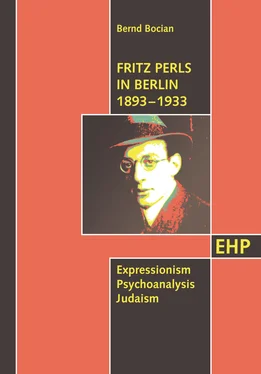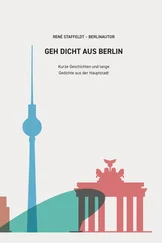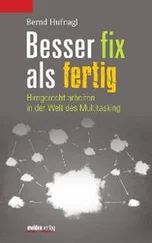Bernd Bocian - Fritz Perls in Berlin 1893 - 1933
Здесь есть возможность читать онлайн «Bernd Bocian - Fritz Perls in Berlin 1893 - 1933» — ознакомительный отрывок электронной книги совершенно бесплатно, а после прочтения отрывка купить полную версию. В некоторых случаях можно слушать аудио, скачать через торрент в формате fb2 и присутствует краткое содержание. Жанр: unrecognised, на английском языке. Описание произведения, (предисловие) а так же отзывы посетителей доступны на портале библиотеки ЛибКат.
- Название:Fritz Perls in Berlin 1893 - 1933
- Автор:
- Жанр:
- Год:неизвестен
- ISBN:нет данных
- Рейтинг книги:3 / 5. Голосов: 1
-
Избранное:Добавить в избранное
- Отзывы:
-
Ваша оценка:
- 60
- 1
- 2
- 3
- 4
- 5
Fritz Perls in Berlin 1893 - 1933: краткое содержание, описание и аннотация
Предлагаем к чтению аннотацию, описание, краткое содержание или предисловие (зависит от того, что написал сам автор книги «Fritz Perls in Berlin 1893 - 1933»). Если вы не нашли необходимую информацию о книге — напишите в комментариях, мы постараемся отыскать её.
Fritz Perls in Berlin 1893 - 1933 — читать онлайн ознакомительный отрывок
Ниже представлен текст книги, разбитый по страницам. Система сохранения места последней прочитанной страницы, позволяет с удобством читать онлайн бесплатно книгу «Fritz Perls in Berlin 1893 - 1933», без необходимости каждый раз заново искать на чём Вы остановились. Поставьте закладку, и сможете в любой момент перейти на страницу, на которой закончили чтение.
Интервал:
Закладка:
In some cases, identification with German culture went as far as Chauvinism, although in terms of culture and not race. Victor Klemperer, for example, reports that his father looked down on the Czechs as an uneducated people and, as a German Jew, even denigrated Austrians of German ethnicity, because »there was simply no other culture that could measure up to Germany … What did blood matter, after all – everything depended on belonging in an intellectual sense« (Klemperer in Heer 1997, 27). Norbert Elias recalls that growing up in Silesia in the shadow of a father who felt himself to be a Prussian, he viewed anyone from the East, in other words, the »Polacks« or the Russians, as cultural barbarians and inferior human beings (see Elias 1996, 28 f.). Ernst Toller, who grew up in the Prussian-occupied town of Posen, also recalled that he believed the »Polacks« to be »the descendents of Cain, who had slain Abel and been marked by God for it« (Toller 1994, 11). Toller continues: »In all strife involving the Poles, Germans and Jews formed a united front. The Jews considered themselves pioneers of German culture. (…) On the Emperor’s birthday, the Jews sat at the same table as the officers of the reserve, the members of the veterans’ association, and the rifle club, drinking beer and schnapps and celebrating Kaiser Wilhelm« (ibid. 11 f.). During the First World War, Toller also encountered chauvinistic Jewish military doctors and non-commissioned officers (see ibid, 72). I mention these facts to forestall the emergence of a one-sided or after-the-fact idyllic, ultimately racist image of German Jews as better people who were inherently imbued with cosmopolitan humanism. If a large number of German Jews were so inclined, then it also had to do with their social situation, as I will later demonstrate.
In sum, the history of German Jews at the time Perls was born, that is, in the latter part of the final decade of the 19 thcentury, presents itself as a history of social advancement (see Bildarchiv 1983, 245, Vulkov 1994, 67). Although this also fuelled anti-Semitism, initially the influence of the anti-Semitic parties declined in the following years. A »new liberal upsurge« took hold (Vulkov ibid.), and Jews continued to feel safe in Germany and generally also at home.
2.2 Bourgeois Humanism Turns into Nationalism
After the founding of the empire, Berlin experienced an industrial upswing along with enormous population growth, particularly in the working classes. The majority of the blue-collar masses lived in dark, dank, overcrowded tenements under inhumane conditions. The birth rate was high, as was child mortality. The average workday consisted of eleven hours; people worked six days a week with two or three vacation days per year. Naturally, member ship in labor unions rose under such conditions as did the social democratic percentage of the vote.
At the end of the 19 thcentury, the Jews in Berlin were predominantly merchants and independent proprietors of mid-sized businesses. A smaller number of them had already belonged to the upper, in part aristocratic, social circles for generations. Many of them held prominent positions in society as factory owners, publishers and bankers, members of parliament, lawyers, doctors, patrons of the arts, and journalists. They availed themselves of the opportunities for economic growth and advancement offered through legal emancipation in the Prussian-German empire, and in a certain sense they were representatives of the new bourgeois-capitalistic society that was constantly evolving and ever changing people’s lives. One of the consequences of this was the admixture of an anti-materialistic, anti-modernist and anti-capitalist element in the new racist anti-Semitism which continued the pre-bourgeois Christian hatred of the Jews.
The Jews who rose economically and socially became part of the bourgeoisie and adopted its social norms, educational ideas, and cultural values. The central focus was an orientation based on the liberal German enlightenment and classical, 18 thcentury German literature and philosophy. In particular Lessing, who had memorialized his friend Moses Mendelsohn in a play entitled »Nathan the Wise,« stood as the »Platonic ideal« of a German (see Heer 1997, 34). The German Goethe-cult came about with robust support from German Jews, and Friedrich Schiller, who was viewed as the »spokesman of pure humanity« (Scholem 1995, 30), was immensely important in that capacity to Jews from both West and East. Additional representatives of German culture also enjoyed great esteem, such as Humboldt, Herder, Jean Paul, Kant, and others.
As a result of the French Revolution and the emancipation movements spurred by the Enlightenment, a number of Germany’s Jews had set out in search of an identity and homeland that were independent of race and religion. They were willing to surrender their old identity as members of a Jewish people. In German-speaking countries, increasing numbers of them adopted an orientation based on the humanistic view of mankind and the educational ideals of the German Enlightenment which at the time were still characterized by tolerance, rationality, and liberal-mindedness. In the spirit of Lessing, the focus was on the education of humankind and the process of self-education that transformed traditional hereditary class distinctions. Here, it depended on what individuals made of themselves and what enabled them to »educate« their personalities as holistically as possible. For those who were adopting an orientation based on this tradition and, as of the first half of the 18 thcentury, had begun to leave the ghetto, that centuries-old compulsory yet simultaneously self-chosen housing of their identity, Germany was essentially a cultural nation. Assimilation took place through education; becoming a German was a question of one’s mentality and not one’s blood or ethnic origin.
Based on information about the escalating revolutionary terror in France and subsequent disappointment over the behavior of French revolutionary troops, who often acted like a conquering army, liberal and even pro-revolutionary German democrats increasingly distanced themselves from the French model. The disappointment experienced by Schiller and Hölderlin over Napoleon’s self-coronation as Emperor is well known, as is Beethoven’s outrage. As history unfolded, a further segment of the German population renounced its initial alignment with the libertarian ideals of the French Revolution and increasingly began to reject everything that was French, democratic, and came from the West. We also must not forget that armed missionaries who attempt to force a republic, or freedom and democracy, upon another people are seldom met with love.
The ideal of a democratic German republic culminated a second time in the revolutionary attempts of 1848. It was brutally quashed and unleashed on the USA the mass immigration of the so-called »Forty-Eighters« who would make major contributions to the nation’s development. 9After the founding of the empire in 1871, the majority of the bourgeoisie turned away from the ideal of democratic unity and began once again to lean more toward the norms and values of the aristocracy and the military. There was a decisive shift away from the cosmopolitan sentiment of the Enlightenment in the direction of nationalism and racist volkish ideas. Corresponding to that, the classical figures mentioned above were nationalized, re-interpreted in nationalistic terms, and thereby transformed into German heroes, so to speak. Particularly disastrous was the progressive unraveling of the early-bourgeois unity of education and humaneness, so that professors, judges, pastors, and officers now viewed human qualities as un-German and an expression of spinelessness (see Glaser 1985, 172). Hermann Glaser also spoke of a »departure from the universalhumanistic frame of mind and a move into nationalistic thinking« (Glaser 1993, 112), calling it the destruction of the German mind in the 19 thand 20 thcenturies and describing it in vivid detail several times. Glaser refers to the pattern of mentality that came into being in those years as the »petty bourgeois ideology.« Culture became a façade, mythos no longer counterbalanced logos but instead replaced it, and »repression and complexes replaced emancipation and autonomy« (Glaser 1993, 150). Goethe, for whom the distinguishing qualities of German character were openness and tolerance, as for example in his play »Hermann und Dorothea,« was stripped of his humanism and transformed into a national hero. The dialectical world view of the early Romantic period, which had made an attempt to synthesize mind-body dualism into a higher holistic concept, was reduced to an either-or. The idealistic educational élan in the language of Schiller perished in hollow pathos that was turgid, aggressively nationalistic, and ubiquitous, although it was particularly prevalent among university professors. Friedrich Nietzsche – loved by the Nazis solely for his individualistic, anti-Christian, misogynous, and antisocialist philosophy of disinhibition, and yet thereby stripped of his ambivalence 10– had looked ahead and spoken early on of the destruction, »the defeat, if not the eradication of the German spirit by the German Reich.« Nietzsche saw clearly that it was the German culture discussed here, which had in the interim become the »former German culture,« (Nietzsche 1992, 363) that had made Germany interesting for the other peoples of Europe. After the founding of the empire, these traditions were »cast off with blind zeal« (ibid.), and the Germans »could find nothing better with which to replace them than political and national insanity« (ibid.).
Читать дальшеИнтервал:
Закладка:
Похожие книги на «Fritz Perls in Berlin 1893 - 1933»
Представляем Вашему вниманию похожие книги на «Fritz Perls in Berlin 1893 - 1933» списком для выбора. Мы отобрали схожую по названию и смыслу литературу в надежде предоставить читателям больше вариантов отыскать новые, интересные, ещё непрочитанные произведения.
Обсуждение, отзывы о книге «Fritz Perls in Berlin 1893 - 1933» и просто собственные мнения читателей. Оставьте ваши комментарии, напишите, что Вы думаете о произведении, его смысле или главных героях. Укажите что конкретно понравилось, а что нет, и почему Вы так считаете.











